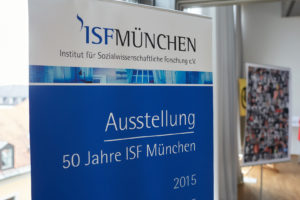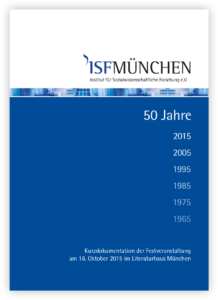ISF Munich is among the leading research institutes advancing the sociology of work and industry in Germany. For more than 50 years now, this independent, not-for-profit institute has been conducting research on varied topics and shaping developments in the sphere of work. Its research is largely funded by project-specific grants.
Our Core Expertise—Work
Our research examines every sector in society from the perspective of work. Stakeholders across society—from individuals to enterprises and from organizations to politics—need knowledge about work and strategies for shaping it.
ISF Munich performs empirical social research in a broad sense of the term. Our remit includes studies carried out in enterprises and interviews with employees and experts as well as theoretical reflection, work oriented towards practice and shaping practice, policy advice, knowledge transfer and public outreach. Our holistic approach is reflected in a diverse mix of project types: the institute is active in basic research and also takes on specific reporting, research and intervention mandates. Projects [German]
ISF Munich works closely with enterprises (ranging in size from micro-enterprises to multinational corporations) and with numerous public institutions, business associations and trade unions. It cooperates on an international scale with national and international universities, specialist research institutes in multiple disciplines and data-holding institutions. ISF Munich projects are funded by ministries, especially the German Federal Ministry of Education and Research, by foundations such as the Hans Böckler Foundation, the Volkswagen Foundation and the German Research Foundation (DFG), and by the European Union. References/Partners [German]
ISF Munich lives by two principles reflected in its organizational model, self-organization and flat hierarchies. Upwards of 40 employees, all experts working autonomously, collaborate in and across networked teams. The Institute Council, a committee formed from ISF Munich staff members, manages the institute as a whole.
Our Tradition
Founded in 1965, ISF played a pioneering role in research in the sociology of work and industry early on in Germany. Over the past 50 years, it has maintained its status as an independent research institute sited beyond the university context and largely independent of general support grants from the state or any other source of funds.
Milestones in German industrial sociology research have been achieved at ISF Munich, especially with regard to the tight integration of the theoretical and empirical analysis of enterprises and society. A few representative (but by no means exhaustive) landmark developments are outlined below.
- In the 1960s, the legendary three-volume “Der Stern” report documenting vocational education and training opportunities and career prospects in the Federal Republic of Germany appeared.
- In the 1970s, the Munich labour market segmentation model,
- the Munich strategy approach giving firms an independent strategic role in the valorization of capital (“Münchner Betriebsansatz”),
- and questions of wages and performance summarized in the punchy formula of the “wage incentives crisis” were formulated and analysed.
- In the 1980s and 1990s, research on systemic rationalization was carried out, much of it in cooperation with Japanese researchers,
- the concept of “subjectifying work action” was elaborated, with its focus on the influence of experiential knowledge and subject qualities of workers,
- and, last but not least, significant contributions to the methodological arsenal of industrial sociology were realized, especially in terms of enterprise case studies and intensive qualitative interviews.
At no point in its long history has ISF Munich ever concentrated its attention solely on large-scale industry. Right from the beginning, small and medium-sized producing and service sectors have also been studied. And ever since these early beginnings, the topic of work has never represented a limitation, but a perspective: ISF Munich’s research remit has taken in wider issues of individual and social life such as work-life boundary management or education and training.
ISF Munich’s research areas have evolved considerably over the years. But our fundamental focus remains unchanged: our precise empirical and theoretical scrutiny of work continues to furnish insights that go well beyond the narrow domain of work itself.





